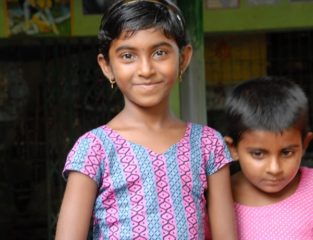Every year, the world celebrates International Day of the Girl Child on October 11 — a day to celebrate the world’s 1.1 billion girls as a source of power, energy and creativity. Each and every girl teems with potential to create a sustainable environment that is better for everyone.
When girls are able to go to school and get an education, they are empowered with knowledge and skills that lift them out of poverty. When young girls aren’t forced to marry, they are able to achieve their full potential and create a ripple effect that improves incomes, maternal health, and child mortality and malnutrition.
This year’s theme is “EmPOWER Girls: Emergency response and resilience planning.” The theme is an acknowledgment of the fact that in 2016, approximately 535 million children were living in countries affected by conflict, natural disasters, epidemics and other emergencies worldwide, with nearly 50 million children on the move, more than half of whom were forcibly displaced.
Though The Hunger Project does not engage in emergency response, our work places great importance on the resilience, health and well-being of girls. That’s why each year we celebrate International Day of the Girl Child to join global efforts to ensure a world free of discrimination against girls.

Today, more girls are in school, fewer girls are being married before the age of 18, and more young women are growing up to be successful agents of their own change. However, there is still a lot of progress to be made.
This International Day of the Girl Child, let’s reaffirm our commitment to empowering girls to lead healthy and secure lives. Girls have already changed the world for the better, and this generation has the power to end hunger and poverty once and for all.
What We Do
– Global programs to end child marriage: Last year we launched Her Choice, a global coalition that includes The Hunger Project and Netherlands-based organizations Stichting Kinderpostzegels Nederland, International Child Development Initiatives (ICDI) and the University of Amsterdam. Her Choice works to activate local leadership to create an environment in which child marriage is not tolerated, and we do this through programs, research, learning and advocacy. With funding from the Dutch Ministry of Foreign Affairs, the program runs until December 2020 and will tackle the root causes of child marriage in 11 countries, with The Hunger Project focusing on Bangladesh, Benin, Burkina Faso, Ethiopia, Ghana and Uganda.
– Advocate for the end of child marriage locally: In Bangladesh, we launched the National Day of the Girl Child in 2000. Since then, the day has been marked on September 30 with rallies, events, discussions, competitions and more. The Hunger Project-Bangladesh leads a vast network of 500 NGOs, government ministries, schools, colleges and women’s organizations in the National Girl Child Advocacy Forum, which advocates for the importance of providing better healthcare, nutrition and education for girls.
 – Increase awareness of the harmful effects of child marriage: At The Hunger Project, we encourage girls to go beyond their comfort zones and challenge existing barriers and stereotypes. Earlier this year, THP-India led a group of visionary young girls on a life-changing journey from India’s state of Bihar to the state of Rajasthan. On their journey, the group promoted the empowerment of women and girls and shared stories and experiences about the negative effects of child marriage.
– Increase awareness of the harmful effects of child marriage: At The Hunger Project, we encourage girls to go beyond their comfort zones and challenge existing barriers and stereotypes. Earlier this year, THP-India led a group of visionary young girls on a life-changing journey from India’s state of Bihar to the state of Rajasthan. On their journey, the group promoted the empowerment of women and girls and shared stories and experiences about the negative effects of child marriage.
– Promote girls’ safety in schools: In Bangladesh, we have also implemented the “Safe Schools for Girls” program. The program, which runs in partnership with USAID-funded organization International Television Service, seeks to increase girls’ attendance in school, reduce dropouts, improve the quality of education available to girls and promote additional opportunities for girls in and out of school.
– Promote Equal Education for Girls: Animators across our Program Countries run educational campaigns to promote childhood primary school enrollment, especially for girl children.
– Measure and analyze gender-specific data: Our women-centered approach emphasizes the importance of gender-specific monitoring and evaluation, including by:
Collecting sex-disaggregated data in areas such as child health monitoring, attendance in school, financial inclusion and child marriage;
Implementing The Hunger Project’s Women’s Empowerment Index, which measures women’s empowerment in five key domains;
Developing new tools to measure the empowerment of elected women leaders in India
This Day of the Girl, join us to recognize girls’ rights, highlight the unique challenges they face and underscore their unique potential to make the world a better place.
What You Can Do
– Change a girl’s life by investing in our work. When you invest in The Hunger Project, you’re investing in the empowerment of women and girls who are ending their own hunger and working toward a healthy and fulfilling life of self-reliance and dignity. Your investment can change lives.
– Join the global conversation on Twitter, Facebook and Instagram, and tell the world that it’s time to empower young girls everywhere. Follow the conversation online with #DayoftheGirl and #IDG2017.
